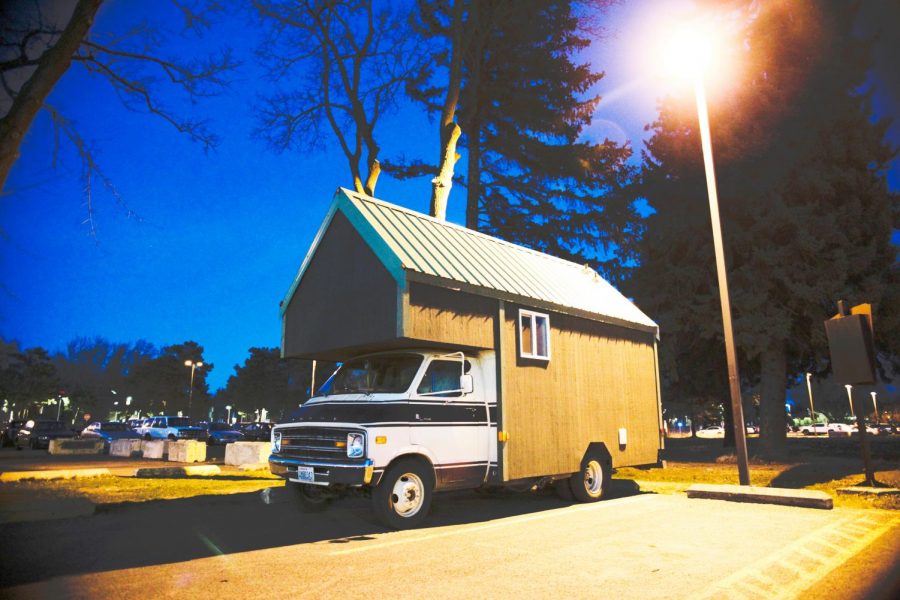Dodge-ing housing costs
A CWU student builds a “house-car” as a creative alternative to affordable housing
A student has found a way of avoiding steep housing costs by way of his custom Dodge truck.
April 4, 2018
The cost of housing can be one of the highest expenses that a college student faces. Many students will try a variety of methods to avoid these costs, from living with roommates to becoming a resident assistant. Troy Thornton, a senior elementary education major, came up with a solution to this problem.
By modifying an old rotted-out Dodge motorhome, Thornton has created a “house-car,” which he has been living in to cut costs.
Thornton figured that if he was to rent an apartment, it would cost him around $900-$1,200 a month, which was not something he could afford. This left him with two options: build something that he could live in or drop out of college. With this in mind, he took time off during fall quarter and started building his new home. By winter quarter the vehicle was finished and Thornton has been living in it ever since.
“I wanted to build it like a conventional house on the back,” Thornton said.
According to Thornton, he has heard only positive reviews from the community, with some people even leaving complimentary letters on his windshield. He decided to start calling the vehicle “house-car,” after hearing the community refer to it as such. “Everywhere I go people give me a thumbs up or a wave. Children wave a lot and a lot of times they yell out ‘house-car!’” Thornton said. “People will laugh and smile and wave and so I feel like I am kinda spreading joy everywhere I go. I like seeing people laugh and smile. I really enjoy that.”
According to Thornton, campus police like the house-car. As long as he parks it on the side of the street overnight he is not breaking any university rules. If he sleeps in it overnight in a university parking lot, it would technically be considered camping on campus property.
When Thornton was in the 8th grade, his parents lost their house due to economic troubles which left his family to live in motels and travel trailers for a couple of months. It was during this time that Thornton came up with the idea of building a house-car.
“I got the idea that the only way I was ever going to be able to afford a home is if I built it myself,” Thornton said.
Thornton then got into construction at a community college, where he fell in love with woodworking. Since then, construction has been a big part of his life.
Thornton is still working on the “house-car.” He plans to add solar panels over the summer, which will give him a strong source of electricity. Adding solar panels to the vehicle will also be of use to him later, as he plans to keep it after he graduates and use it as a solar farm at his real house on his property.
According to Thornton, many people who see him driving it question its height, fuel efficiency and legality.
“It is legal,” Thornton said. “I checked with state patrol before I did it.”
The entire “house-car” cost less than $2,500, which Thornton is happy with considering he would be paying much more for an apartment over the course of his remaining time at CWU. He would recommend this way of life to other students because it has been working so well for him.
“Housing is so expensive and it’s getting worse all the time,” Thornton said. “This is a way that people can provide a shelter for themselves who can’t afford to do it the conventional way.”




Mariah • Apr 8, 2018 at 6:17 pm
Thank you for reaching out to learn the truth behind the house-car! People speculate about it a lot around campus, and it’s good to hear the truth straight from the owner 🙂
Chris Gant • Apr 8, 2018 at 7:03 am
Great article Jack! Keep up the good work ?
Margy Belcher • Apr 5, 2018 at 8:51 pm
Great idea. My congratulations to you young man. Very good article.